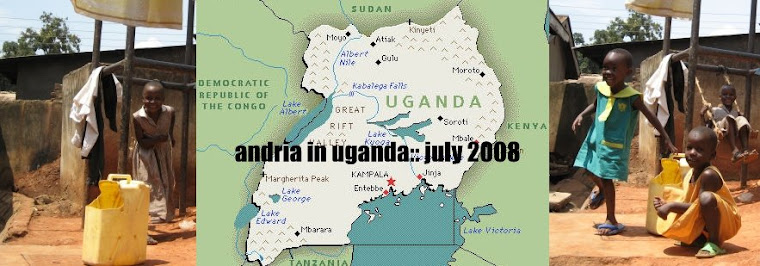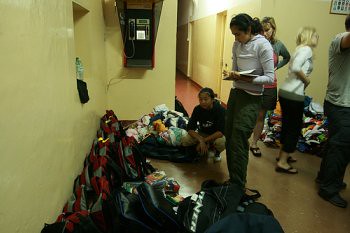
Nick takes a video of them yelling "THANK YOU SOFTCHOICE!" at the top of their lungs. Milton makes a speech about how much we mean to the boys and to him, which has my eyes starting to water a little, and then Nick talks about how much getting to be a part of their centre for a short while has meant to us. He lets the boys know we want to raise money so that they can go to school. He reminds them that Milton is a role model for them, that they should continue in his path and follow his example. He says that he knows they may have done things they don't feel too proud of, but that they should forgive themselves for the bad things they may have done in the past, and understand that life and love are about giving. That they should approach the future with this in mind. The words are well spoken and remind me of something you'd hear in church, except that Nick somehow manages to keep any religion out of it.
At this point Milton starts sobbing softly and holding onto to Nick. Watching this grown man weep is pretty moving. He just doesn't know how he can express his gratitude, he tells us. Then the boys start hugging us all, really tightly. One boy Phillip, puts his head in his hands and starts crying. These are tough street kids. I can hardly believe the scene in front of me.

When a taxi pulls up to take us back to our hostel, we are all mess of emotions. Even once we are inside the vehicle, the boys and all the neighbouring kids come up to put their hands up against the windows. I open my window and one of the boys hands me his cardboard crown. Amy is bawling in the seat in front of me - I give her shoulders a little squeeze, and put the crown on her head. And, then just like that, we drive away for the last time. Or maybe not, I don't know. Maybe some of us will be back to check up on our friends at African Child in Need. And at the OCA Computer Centre. And the babies and toddlers at the Sanyu Home. I hope that I will see them all again.

I have to figure out how I can continue to support these great people when I get back home, how I can share their stories with those who aren't lucky enough to have met them firsthand. I'm not sure what the answer to this is yet, but I feel sure there is a way.
In just over an hour another taxi will arrive - this one will take Jenn, Eric and I to Entebbe airport, where we will begin our journey home. I can't believe our last few hours are actually here. I'm going back to where there is consistent power and hot water; where the roads are maintained and there's organized public transit; where bathrooms are luxurious in comparison; where garbage is collected; and glass and plastic recycled. But I'm also going back to a place where everyone always wants more stuff, and bigger and newer and better stuff, and it's all about getting that stuff, and what you become when you have it. And that's going to be a bit depressing for me, I think. I hope that I'll be thankful everyday for the simple things.
I can't wait to share my stories with everyone. I can't wait to give Mike a giant hug and start at the beginning of my adventures here and not shut up until my throat hurts and my eyes are heavy. I can't wait to cuddle with Siris and Senor Snuggles; to call up friends; to sit at my favourite table at the Communist's Daughter and take in a little live music.
Goodbye Uganda, with your red, red soil and your loving people - I hope I'll be back one day to see what you're up to. I remain eternally grateful for these last two weeks, and I don't want to forget a single part.


















































